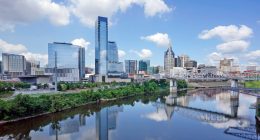Quick delivery became a pandemic lifeline for many – but is the endless cycle of cardboard putting an undue strain on the planet, our infrastructure and workers?
The pandemic turned the US into a next-day delivery nation. Amazon, in particular, saw sales surge during the dark days of Covid. In the first three months of 2021, the company watched its total sales tick up by 44%, constituting $8.1bn in profit. Those sales were led by the 200 million subscribers to Amazon’s super-fast delivery service Prime as people demanded everything from desk chairs to bananas delivered the next day.
Amazon sold 44% more items during the pandemic, but the cost of fulfilling those orders increased by only 31%. This saving was one of scale – high-order volume allowed Amazon to operate even more efficiently. “It has run its warehouses closer to full capacity, and delivery drivers have made more stops on their routes, with less time driving between customers,” reported the New York Times.





